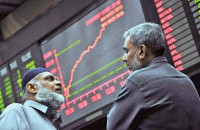An alternative to financing investment
For individual investors mutual funds provide numerous benefits.

Mutual funds on the other hand are a product of the masses, for the masses. They have withstood the pressures of the financial crisis and global assets under management have now started rising again. They play an integral role in the world of finance, a force that has powered the middle class growth, provided depth to capital markets and added dynamism to many economies. Long just a peripheral player in the world of capital markets, the mutual fund industry now commands the stage with $23 trillion in assets under management.
Yet, mutual funds are not appreciated by our policy-makers. They at best considered them to be obscure products designed for wealthy individuals and large corporations. The fact is that mutual funds can serve Pakistan’s economy as an important component of growth.
For individual investors mutual funds provide numerous benefits: access to professional investment management, diversification of funds in various asset classes, tax credit of up to Rs300,000, ability to invest for as little as Rs5,000, liquidity offered by open end funds and transparency. More significantly, through individual investors, they have the ability to change the workings of the marketplace itself. As the number of retail investors grows, the depth of Pakistan’s capital market will increase and in time individuals and not a handful of corporations will influence the market.
Savings are essential to the well-being of individuals as well as Pakistan’s ailing, debt-ridden economy. Our savings-to-GDP ratio of 10 per cent is the lowest in the region. India’s savings rate has now touched 30 per cent. We have a weak capital market and foreign aid, IMF loans are no substitute for domestic savings and investment. An essential condition for financial savings is a capital market that can provide accessible and economical instruments, such as mutual and pension funds, to enhance savings. Only savings will ensure sustainable, long-term growth.
A holistic, long-term approach is required to bring about the necessary reforms in Pakistan. Encouraging the growth and promotion of pension, insurance and mutual funds will go a long way in creating depth of our capital market and providing a source of credit for government and private enterprises alike. Financing needs of large infrastructure projects, such as dams and motorways, should be met via the capital markets. It is the capital market which must finance economic development and it is the capital market which should channelise people’s savings into such investments.
Published in The Express Tribune, September 1st, 2010.


















COMMENTS
Comments are moderated and generally will be posted if they are on-topic and not abusive.
For more information, please see our Comments FAQ